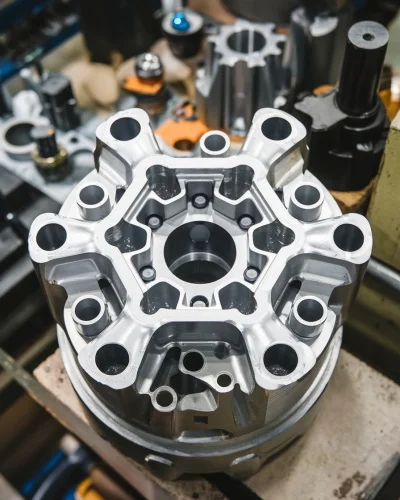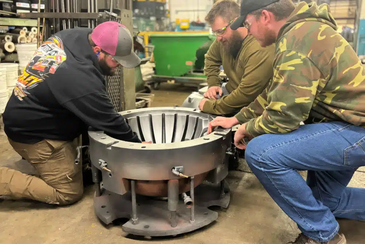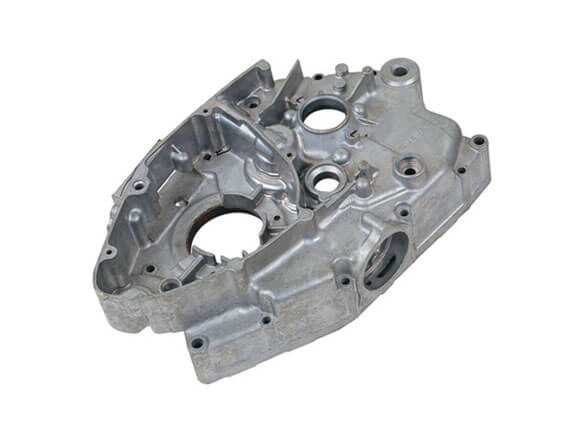How an Aluminum Casting Company supports efficiency in production
Wiki Article
Exploring the Innovative Procedures Behind Modern Light Weight Aluminum Shop Workflow
Modern light weight aluminum shop operations are going through substantial makeover. Automation and AI are improving manufacturing methods, enhancing both effectiveness and accuracy. The assimilation of 3D printing is simplifying mold and mildew development, while sustainability practices are coming to be extra vital. Each of these advancements plays a key function in redefining the market. The implications of these modifications expand past plain manufacturing performance. What opportunities and obstacles lie in advance for aluminum factories in this developing landscape?The Duty of Automation in Light Weight Aluminum Foundries

Automation adds to improved safety criteria within the factory environment. By moving unsafe tasks to machines, human workers can concentrate on supervisory roles and quality assurance, decreasing the risk of mishaps. In enhancement, information analytics originated from automated procedures supply useful insights right into functional efficiency, causing better decision-making and continuous improvement. As the demand for light weight aluminum products expands, the fostering of automation technologies will likely broaden, further changing the landscape of aluminum foundry operations.
Improvements in Casting Technologies
Current developments in casting modern technologies are transforming aluminum shop operations. Technologies such as 3D printing assimilation, advanced alloy formulations, and automated procedure optimization are improving effectiveness and product quality. These advancements are essential in meeting the evolving needs of the industry.3D Printing Combination
Incorporating 3D printing innovation right into aluminum shop operations has reinvented conventional casting methods, boosting both efficiency and accuracy. This innovative approach permits the quick production of complex molds and cores, greatly decreasing lead times and product waste. By utilizing additive production, shops can develop detailed geometries that were formerly tough or difficult to achieve with conventional techniques. The flexibility of 3D printing also enables quick layout alterations, cultivating an extra nimble production process. In addition, this integration sustains making use of lightweight structures, which is increasingly essential in sectors such as automobile and aerospace. As aluminum factories remain to adopt 3D printing, they position themselves at the leading edge of technological improvement, driving renovations in product quality and operational capacities.Advanced Alloy Formulations
The advancement of advanced alloy solutions has significantly enhanced spreading innovations in aluminum shop operations. These solutions integrate various components, such as copper, silicon, and magnesium, to improve mechanical properties and thermal resistance. By customizing the composition of aluminum alloys, makers can achieve details performance features that meet the needs of diverse applications, from auto elements to aerospace frameworks. Making use of innovative alloys also adds to reduced weight and boosted strength, which are important elements in modern-day design. Additionally, technologies in alloy advancement make it possible for much better fluidness during spreading, causing improved surface finishes and minimized issues. Generally, progressed alloy formulations represent a substantial jump forward, positioning aluminum factories to fulfill the evolving needs of different markets properly.Automated Refine Optimization
Developments in casting modern technologies have actually paved the way for automatic procedure improvement in light weight aluminum foundry operations. By integrating advanced software and real-time data analytics, factories can now enhance manufacturing procedures and boost quality assurance. Automated systems keep an eye on variables such as temperature, stress, and cooling prices, permitting prompt adjustments that minimize defects and waste. Additionally, artificial intelligence formulas examine historic performance information to forecast ideal settings, therefore raising performance and reducing cycle times. Robotics also play a significant duty, taking care of recurring tasks that enhance safety and security and accuracy. In general, these developments not just drive functional efficiency however also enable foundries to meet the expanding need for top quality aluminum parts in different markets.Smart Manufacturing and Sector 4.0 Integration
The integration of Smart Manufacturing and Market 4.0 within aluminum foundries is transforming operational performance. By leveraging IoT modern technologies, automation, and robotics, foundries can optimize manufacturing procedures and lower downtime. In addition, data analytics offers crucial understandings that boost decision-making and drive continual renovation.IoT in Foundry Procedures
As producers progressively embrace the Web of Things (IoT), shop procedures are experiencing a transformative shift towards smart production and Market 4.0 integration. aluminum casting. IoT technologies enable real-time data collection and analysis, boosting decision-making processes and operational efficiency. Sensing units and connected tools keep track of devices performance, product use, and environmental conditions, enabling aggressive upkeep and resource optimization. This connection fosters a much more active manufacturing atmosphere, where modifications can be made promptly in action to market demands. Additionally, IoT promotes improved traceability and top quality control, as data from the entire manufacturing cycle can be conveniently accessed and assessed. Generally, the combination of IoT in factory operations considerably enhances productivity and drives development in aluminum production proceduresAutomation and Robotics Combination
Automation and robotics integration is transforming aluminum factory procedures by improving performance and accuracy. This transformative method improves procedures such as molding, pouring, and ending up, lowering human error and enhancing output uniformity. By utilizing sophisticated robot systems, shops can attain higher production prices while preserving rigorous top quality criteria. Automated systems also enable real-time surveillance and adaptive control, permitting quick modifications to manufacturing criteria. Additionally, the combination of robotics reduces labor costs and mitigates security dangers related to hand-operated handling of liquified steel. As shops embrace clever production principles intrinsic in Sector 4.0, the synergy in between automation and robotics solidifies their affordable side, leading the way for lasting development and innovation in the aluminum casting field.Information Analytics for Effectiveness
Utilizing information analytics greatly improves efficiency within light weight aluminum foundry operations, aligning with wise production and Market 4.0 concepts. By leveraging real-time data collection and analysis, shops can keep track of production processes, anticipate tools failures, and optimize source appropriation. This data-driven method facilitates insightful decision-making, making it possible for managers to determine traffic jams and improve process. In addition, predictive analytics equips shops to anticipate market demands, thereby lowering waste and making certain timely product delivery. Combination of information analytics with IoT devices improves operational presence, promoting an aggressive maintenance culture. Eventually, implementing these sophisticated logical techniques not only boosts productivity yet likewise drives development, positioning aluminum factories to satisfy the advancing needs of the sector while keeping one-upmanships in a rapidly transforming landscape.Sustainable Practices in Aluminum Spreading
While the aluminum casting sector has actually commonly encountered ecological challenges, numerous foundries are now adopting sustainable practices to mitigate their influence (Aluminum Foundry). A significant focus has actually gotten on recycling aluminum scrap, which not just lowers waste yet additionally saves energy compared to primary aluminum production. Cutting-edge melting modern technologies, such as induction furnaces, improve power effectiveness and lower greenhouse gas exhaustsAdditionally, factories are implementing closed-loop water systems to reduce water usage and lower thermal air pollution. Using eco-friendly binders in mold-making procedures is obtaining traction, further reducing dangerous exhausts.
Some centers are investing in sustainable power resources to power operations, straightening with worldwide sustainability objectives. By incorporating these practices, the aluminum casting industry is progressing toward an extra eco accountable future, demonstrating that economic growth can exist together with environmental stewardship - Aluminum Casting Company. These initiatives show a dedication to sustainability and the significance of ecological liability in production
Quality Assurance Innovations
As the light weight aluminum spreading industry advances in the direction of sustainability, the value of high quality control technologies ends up being increasingly apparent. Modern aluminum foundries are adopting advanced technologies to enhance their high quality guarantee processes. Methods such as real-time surveillance and information analytics permit suppliers to spot issues and incongruities early in the manufacturing cycle. Carrying out automatic examination systems outfitted with equipment discovering formulas assurances that products fulfill rigorous top quality standards while minimizing human error.In addition, the integration of non-destructive screening techniques, such as radiographic and ultrasonic assessments, provides deeper understandings right into the honesty of spreadings without damaging the material. These advancements not only boost product dependability however likewise decrease waste, aligning with sustainability objectives. Furthermore, the adoption of standardized high quality structures assists enhance operations throughout different factories, assuring consistency in output. Jointly, these innovations are reshaping quality assurance, promoting a society of quality within the light weight aluminum casting field.
Future Patterns in Light Weight Aluminum Shop Procedures
What innovations lie ahead for light weight aluminum factory operations? The future of light weight aluminum foundries is poised for change with developments in automation, expert system, and lasting practices. The integration of robotics and automated systems is anticipated to boost effectiveness and accuracy in the spreading processes, decreasing human mistake and labor expenses. Furthermore, AI-driven analytics will certainly make it possible for real-time tracking and predictive maintenance, optimizing operational performance and lessening downtime.Sustainability remains a focal factor, with shops progressively taking on environment-friendly practices, such as utilizing recycled light weight aluminum and creating low-emission melting modern technologies. Technologies in 3D printing are additionally anticipated to transform mold-making, enabling for intricate geometries and minimized product waste. As the market accepts digitalization, data-driven decision-making will end up being critical, making it possible for foundries to react quickly to market needs. Jointly, these patterns promise to redefine light weight aluminum foundry operations, making them much more effective, sustainable, and versatile to future challenges.

Often Asked Questions
What Precaution Are Implemented in Aluminum Factory Workflow?
Light weight aluminum foundry operations implement numerous safety actions, consisting of personal protective devices, air flow systems to manage fumes, routine safety and security training, emergency reaction strategies, and rigorous tracking of temperature level and equipment to avoid mishaps and warranty worker safety.Exactly How Do Shops Take Care Of Labor Force Educating for New Technologies?

What Materials Are Typically Reused in Aluminum Foundries?
Light weight aluminum foundries commonly reuse scrap Aluminum Casting Company light weight aluminum, including post-consumer products like beverage containers, auto components, and construction products. This recycling procedure minimizes waste and conserves resources, adding to an extra sustainable light weight aluminum production sector.Just How Does Light Weight Aluminum Spreading Impact the Atmosphere?
Aluminum casting impacts the atmosphere with energy-intensive processes, greenhouse gas exhausts, and possible regional pollution. Nevertheless, developments in recycling and lasting practices can minimize these effects, promoting an extra environment-friendly technique to aluminum manufacturing.What Are the Typical Lead Times for Aluminum Casting Projects?
Regular preparation for aluminum casting jobs vary significantly, usually varying from two to six weeks. Variables influencing these timelines consist of complexity, order size, and product accessibility, impacting overall manufacturing schedules in factory operations.
Automation progressively plays a necessary role in light weight aluminum shops, boosting effectiveness and precision in the manufacturing procedure. Innovations in casting innovations have paved the method for computerized process enhancement in aluminum shop procedures. Utilizing data analytics significantly boosts effectiveness within light weight aluminum factory operations, aligning with smart manufacturing and Market 4.0 concepts. A substantial focus has actually been on recycling aluminum scrap, which not just reduces waste yet additionally saves power compared to main light weight aluminum production. Aluminum factories frequently recycle scrap aluminum, consisting of post-consumer items like drink cans, automobile components, and building materials.
Report this wiki page